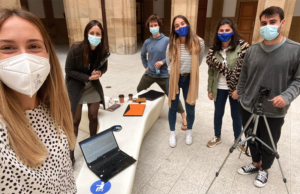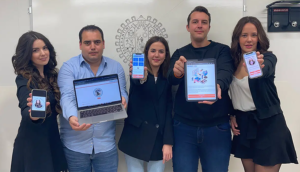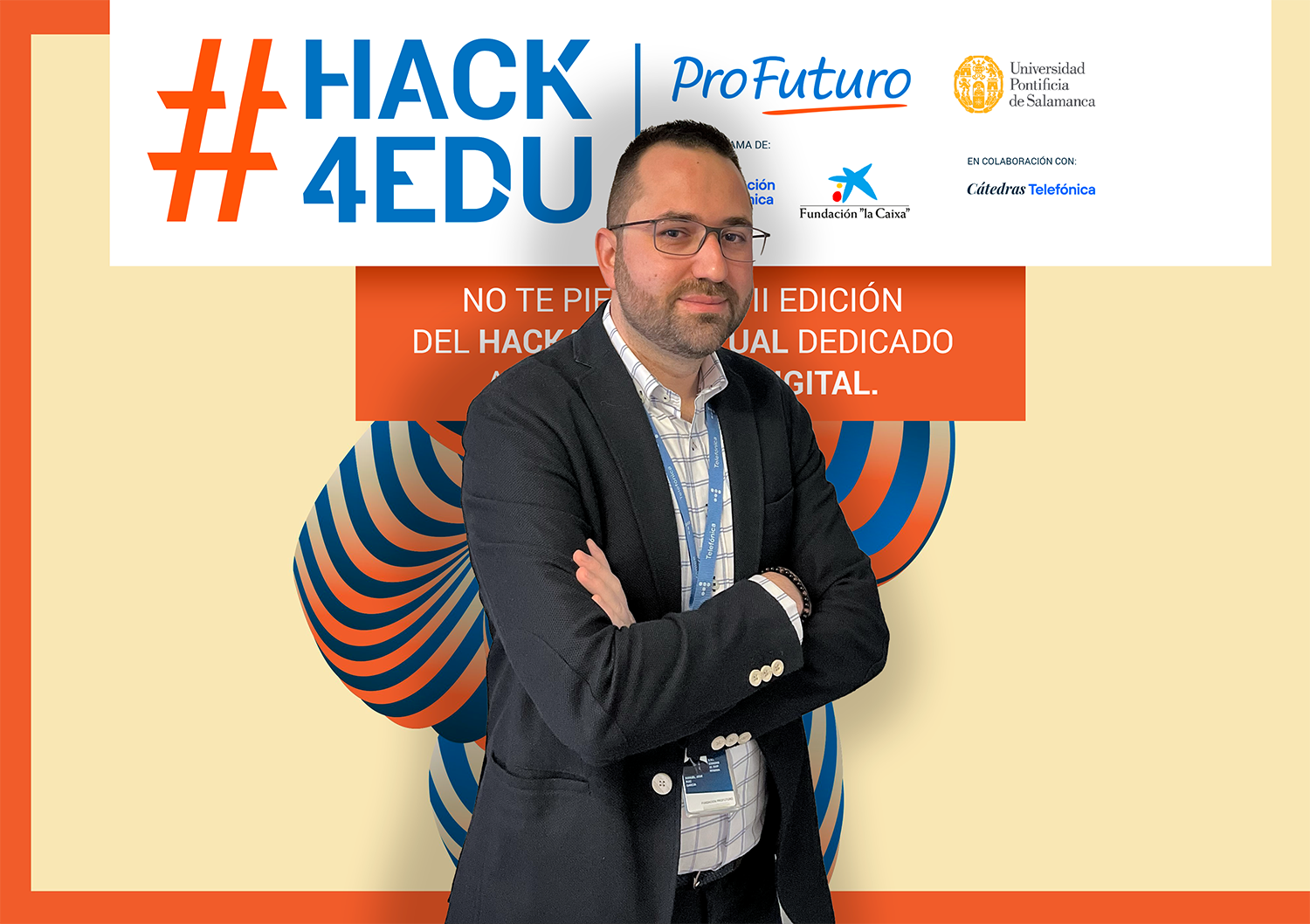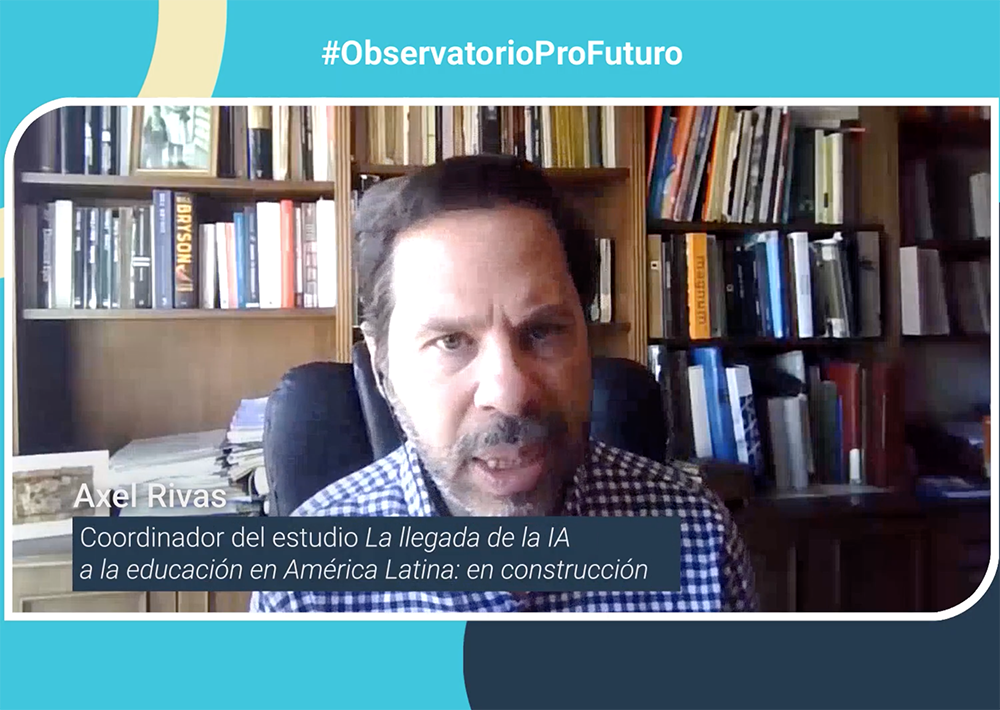The recipe is as follows: launch a challenge (in this case several challenges) and mix hackers and representatives of other specialities related to the education sector in the same team. Add a dash of mentoring and a sprinkling of motivation. Leave them to macerate for three days and nights. The end result: a prototype that overcomes the challenge that’s been set. This is Hack4Edu, a very special hackathon whose aim is the posing and resolving of technological challenges related to the difficulties encountered by digital education in vulnerable environments. In this post one of its promoters, Manuel Ruiz, manager of data analytics at the ProFuturo Foundation, takes stock of two Hack4Edu events and briefs us about some ideas for the next one, which is already being prepared.
Can you tell us how a hacker can contribute to digital education?
On the one hand, we have the challenges posed by digital education in vulnerable environments, which are enormous. On the other, we have the profile of the hacker, which is extremely complex, because he or she is a person who has a huge ambition to break down technological barriers, to see how to resolve any problems that may exist. And, in this case, this is what Hack4Edu focuses on: enabling hackers with an amazing ambition to come up against problems they have no knowledge of, because the good thing about hackers is that they delve into things that may not even have anything to do with their story, but they attract their attention so much that they set about looking for and end up finding solutions to a problem that they didn’t expect to be able to resolve.
The wonderful thing about this is that, when you have lots of hackers with the same problem, as occurs during a hackathon, you realise that there are many ways of resolving the problem and you see how the mind, how these really complex profiles, because ultimately a hacker has knowledge of many areas, have ended up providing totally different solutions for the same problem. The same challenge. In other words, how, in the end, these profiles with such a wealth of knowledge are capable of solving them. At this year’s event we’ve seen the same challenge overcome by three different teams in technologically different ways. In fact, all three have won. It’s amazing how they’re able to look for different and completely new paths.
The Facebook hackathons gave rise to the “Like” button and chat. What will come out of Hack4Edu?
Our main aim, although not the only one, is to resolve the problems we encounter at ProFuturo on a daily basis. We don’t expect a specific product from Hack4Edu. What we hope to do is enrich what we’re offering to the world, in this case by approaching it externally with multi-disciplinary teams that ultimately enhance our ideas.
As an organisation, we face lots of challenges every day. And that’s our raison d’être in many ways. We have different case studies for each country, for each area we’re to be deployed in and even for each school. This obliges us to have a capacity for adaptation within the scope of very few projects; there are 40 countries, each with different conditions and problems. We address these challenges, but the daily work often contaminates us and leaves us unable to find any answers. So these kinds of events give us oxygen and support us. As I’ve already said, due to the motivation and the multi-disciplinary profiles they have and because they complement each other to perfection when it comes to addressing the project, these hackers manage to provide solutions for our problems.
For example?

One of the participating teams in this edition of Hack4Edu. Photo: Andrea Khalfaoui.
Well, for example, you have a team of engineers, of people from nursing, psychology and education, and you tell them that you’re looking for a challenge related to gamification in the classroom. How to approach gamification with technology. And they go and present you with a Pasapalabra that’s super easy and customisable… something none of us had ever thought of. It’s really useful, pedagogically speaking. And it can be extrapolated to all the places we work in; it’s relevant because it can be customised.
So, with their new and open mentality, they’ve overcome the challenge in a way that we, “contaminated” and involved in the day-to-day running of the project, couldn’t have resolved. They could have taken the easy option; they could have proposed that we give them prizes or points for doing collaborative work, something that’s really basic in gamification. But no. They dive in at the deep end. And that’s what we’re looking for. People who leap into the pool, people who are innovative. And this is what Hack4Edu is going to end up providing: projects so novel and innovative that they may even break up our product strategy.
What does an event such as this one bring to the world of educational innovation? What makes Hack4Edu special?
Everything. It brings everything. An organisation may have 500 specialists, but, if it wants to make the most of a project, it has to listen to what others from outside can contribute, and, if you’re also able to motivate them with this kind of event, then you have everything.
Hack4Edu also has two extraordinary elements, namely motivation and the social component, which, together, can bring a great deal of value to the world of educational innovation. The atmosphere generated at a hackathon is really conducive to making the most of the concerns and aspirations of the young people who take part. It’s an event at which the brain has to overcome a challenge in a scenario where lots of emotions come together in a very short space of time. Having this “sentimental” motivational component, this extraordinary social component, knowing that you’re going to have an educational impact on children in vulnerable environments with your idea, multiplies the effect and improves the results of the hackathon. Because bringing together so many people to resolve these challenges and, in addition, coming up with projects that can be tackled in such a short time seems like a real feat to me.
What path do these winning projects take?
We aren’t a business, we’re a foundation, and what we’re looking for, as stated in our regulations, is to have the capacity to continue researching and developing the winning projects. This year we’re going to link it to Fundación Telefónica’s Campus 42. We’re going to hold events with the winners to enable them to talk about their experiences, how they’ve applied different ideas to prototypes and how they’ve organised the work sessions that have ultimately led to the prototypes while offering encouragement to the students at Fundación Telefónica’s Escuela 42. And then we’re going to make a connecting link for tutoring and mentoring.
It isn’t within our remit to provide funding for these projects, I must insist on this. But attempting to give them continuity is. Being the catalysts of the change that the prototype needs for a bigger idea to emerge. Acting as sponsors to support them.
What kind of challenges have been set this year and what do these challenges tell us about the world of educational innovation in vulnerable environments?

The Words4All team, responsible for the Pasapalabra project and winner of the Senior category. Photo: Innovaspain.
We’ve had 32 official challenges this year. At Hack4Edu the challenges are proposed in an open way by individuals or organisations from any entity. This year they’ve focused on inclusion in the classroom. On education as an inclusive medium and seeing how certain problems that we’re currently finding in relation to the above can be resolved. There’ve been numerous challenges in this area. One in particular, the majority one, which several teams have signed up for (and three have actually won), related to children with hearing problems in the classroom.
But we come across other kinds of very diverse challenges, lots of challenges specific to pedagogical activities within the classroom, such as gamification, data analytics, education partnerships, tools that can improve the process in the classroom (such as class lists) and so on. In other words, we’ve found significant diversity, although it’s true to say that issues related to inclusion in the classroom have enjoyed a high degree of awareness.
What do the winning projects tell you? What conclusions have you drawn?
Well, they tell us that if we follow this evolution, the projects at the third event are going to be outstanding. This year, during which we’ve been able to hold a hybrid event, the evolutionary leap made by the projects has been spectacular. The hybrid format has brought about a degree of maturity and professionalism in the projects that we, as an organisation, never thought we could achieve. So what we can see is that we’re exceeding our expectations and that we need a third event with a hybrid format but a greater on-site presence at local venues if the conditions so permit.
What are the evaluation criteria when it comes to selecting the winners? What do you have in mind when you evaluate them?
The main factor is that the challenges address problems that lie very close to ProFuturo. Very specific and very, very real problems that we already know about and others that we’ll see in the coming year. This is how we’ll approach the third hackathon. However, part of the evaluation, something that ultimately makes us choose one project or another in really tight votes, is their relevance to the vulnerable areas we work in. Because you may have a really good, social and educational idea but it might not work in disconnected areas. And, of course, what I mentioned earlier: creativity. The use of technologies no one else has thought of using which, besides, address the same problem in different ways. That it be seen that you’ve given the problem a lot of thought and that you aren’t applying the obvious solution that anyone would apply, one that’s outlined in any forum.
The fact that creativity, motivation, teamwork, collaboration and communication skills are, as Manuel Ruiz says, fundamental ingredients for this hackathon, is no coincidence. All these abilities and skills have acquired fundamental importance for the digital society. Because the technification of our daily lives requires them. Only by applying them can we make intelligent use of technology and capitalise on the digital revolution. Hack4Edu is a great example of the above.






